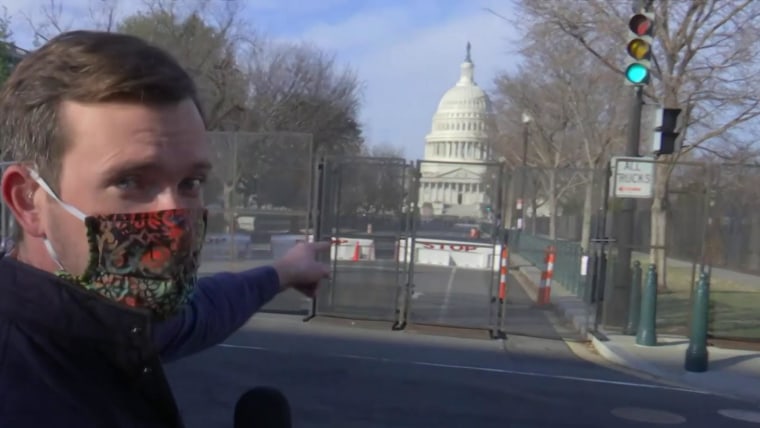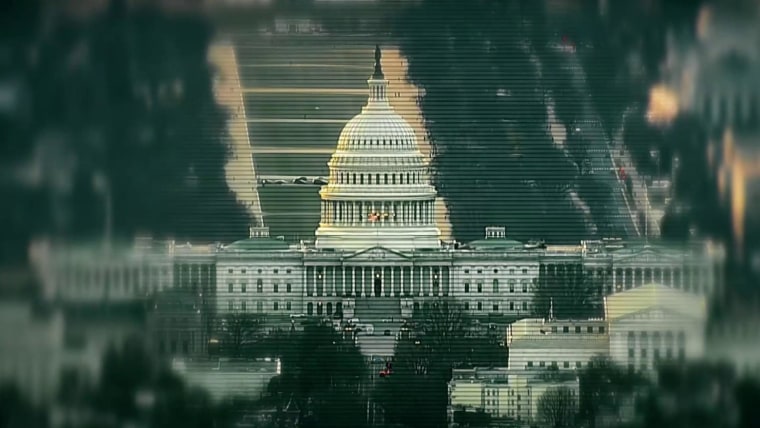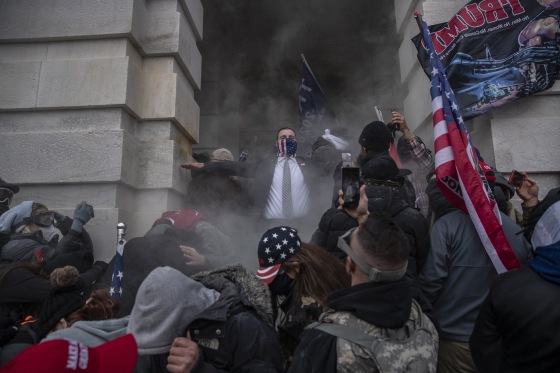"Fascism" is a word we tend to throw around often, and often with little regard to its true definition. But in the case of President Donald Trump and for parts of the GOP, it applies not hyperbolically, but accurately.
The GOP now more closely resembles authoritarian ruling parties like Hungary's Fidesz and Turkey's AKP.
At its essence, fascism — while exhibiting other characteristics, such as attacking democratic institutions and stirring up anger — employs undemocratic methods, especially violence, to acquire and retain power. At the moment, an American fascist movement that uses violence to acquire and hold on to power is no longer a hypothetical; it is already underway.
This is why the siege of our nation's Capitol by Trump supporters to prevent the congressional certification of President-elect Joe Biden's electoral victory cannot be dismissed as a one-off. These events are just a show of coming attractions.
The FBI received information that Trump partisans were calling to "storm" government offices in every state this weekend and on Jan. 20, when Biden will be sworn into office. The Capitol Police warned House Democrats in a briefing Monday night of a plot to kill Democratic representatives so Republicans could take control of Congress.
The National Park Service also announced Monday that the Washington Monument will be closed until after Inauguration Day "in response to credible threats" posed by "groups involved in the Jan. 6, 2021 riots at the US Capitol."

In an interview about her book "Fascism: A Warning," former Secretary of State Madeleine Albright explained that fascism is "not an ideology" like, say, socialism. Rather, "it's a process for taking and holding power." She emphasized that "fascism involves the endorsement and use of violence to achieve political goals and stay in power." At the time in 2019, Albright rejected the notion that Trump was a fascist, saying, "I don't call him a fascist, because he isn't violent."
Well, that has changed. The same experts who before last week's attempted coup were hesitant to use the word "fascist" to describe Trump have changed their tune. One is Robert O. Paxton, a professor emeritus at Columbia University and author of "The Anatomy of Fascism," who declared in a recent op-ed that "Trump's incitement of the invasion of the Capitol ... removes my objection to the fascist label." He ominously added, "The label now seems not just acceptable but necessary."
Trump is not an aberration; he is a culmination of where the GOP has been heading for years.
Trump is not a fascist in a vacuum. He is the leader of a budding fascist movement in America that people like MSNBC national security expert Malcolm Nance warn will usher in more violence.
As Nance explained on my podcast, we are seeing the making of a "Trump insurgency" that he equates to the Iraq insurgency led at one time by Saddam Hussein. Nance detailed that there are three main components to the Trump insurgent forces: QAnon conspiracists, the Proud Boys, a group that has used violence in the past, and the right-wing militia group the Three Percenters.
All three groups strongly support Trump. In fact, despite warnings by the FBI that QAnon posed a domestic terrorism threat, Trump cheered the group in August, saying: "I've heard these are people that love our country. ... They do supposedly like me." And during the September presidential debate, Trump infamously advised the Proud Boys to "stand back and stand by," which prompted members of the group to celebrate, posting on social media, "Standing down and standing by, sir."
These very same extremist groups that Trump has cultivated a following in were involved in the siege of our Capitol. As one protester put it while standing in the Capitol during the attack: "Our president wants us here. ... We wait and take orders from our president."
Those who think these violent elements of Trump's base will leave with him have not been paying attention. Trump is not an aberration; he is a culmination of where the GOP has been heading for years.

First, experts have documented that the Republican Party in recent years has increasingly rejected democratic norms and embraced autocratic tactics to wield power. An October study by V-Dem Institute at the University of Gothenburg in Sweden warned that the GOP had already been moving in that direction pre-Trump, but it said that under Trump, with "the disrespect of political opponents" and "the encouragement of violence," the GOP now more closely resembles authoritarian ruling parties like Hungary's Fidesz and Turkey's AKP.
Second, and this is ever more dangerous, is the sheer number of Republicans who supported the attack on the Capitol. A Reuters poll released Friday found that 22 percent of Republicans approved of what sickened the rest of us. A Marist poll found that 18 percent of Republicans "support the actions of the Trump supporters who broke into the U.S. Capitol."
If these polls are accurate, that means 1 in 5 Republicans approve of embracing violence to keep political power.
In fact, a GOP member of Congress told Politico that days after the siege, the message he heard from his constituents was not shock about the attack but more along the lines of "Do you think that Congress got the message?" And some Republicans noted that constituents such as "preachers, school superintendents, churchgoing men and women," as Politico reported, were actually cheering on the attack rather than condemning it.
If these polls are accurate, that means 1 in 5 Republicans approve of embracing violence to keep political power. That is the textbook definition of fascism. If this extremist wing of the GOP goes unchecked, it is likely to spread as Republicans become angrier with election losses and resort to attempting to acquire power by using force.
The GOP is at a crossroads. Its leaders must very publicly root out the extremists in its base, or it will truly become a full-blown fascist movement.

